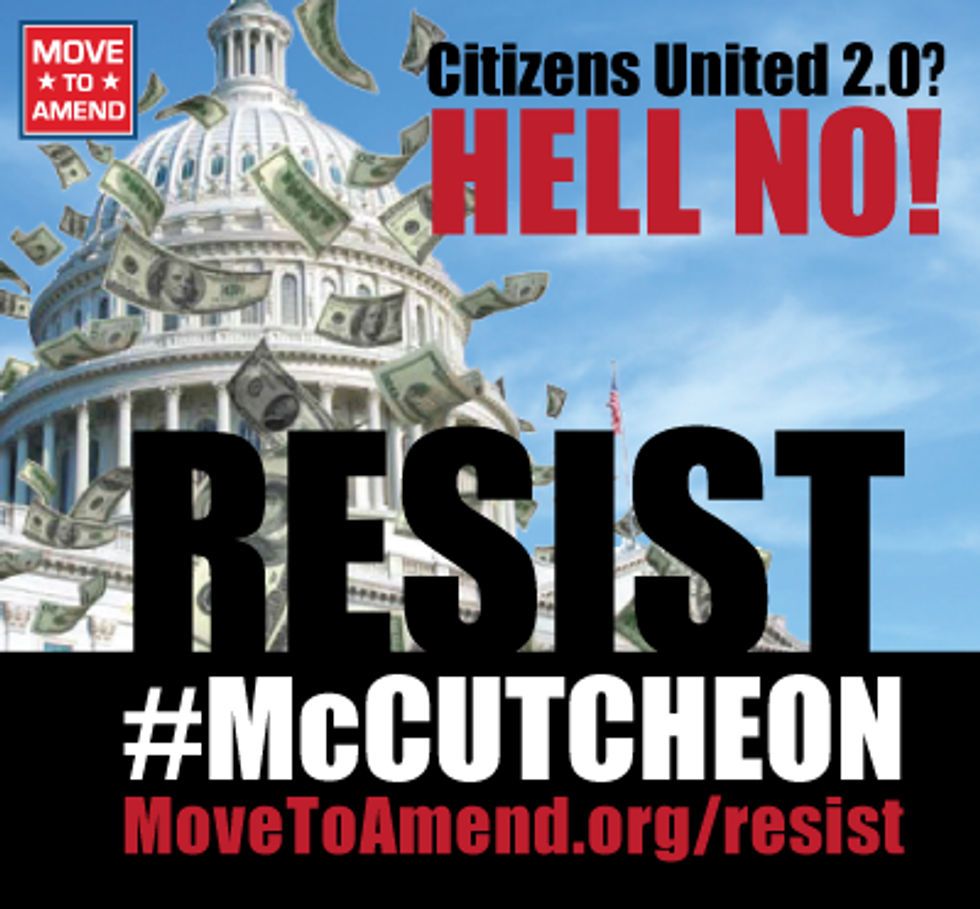The Supreme Court of the United States is poised to continue dismantling restrictions on money in politics in a new case that begins today: McCutcheon v. Federal Election Commission.
The case bears remarkable similarity to the controversial Citizens United v. Federal Election Commission case of 2010, when the Court struck down decades of campaign finance law and re-affirmed their previous position that artificial entities (such as corporations and unions) should have Constitutional rights.
The response to this infamous case sparked a national movement on the part of the American public to propose a constitutional amendment prohibiting the concept of "corporate personhood" and the idea that spending money in elections is protected speech. If the Court takes the opportunity to further legalize bribery and corruption in McCutcheon, it could spark a national revolution.
As the four-year "anniversary" of the Citizens United case approaches, McCutcheon v. FEC challenges the aggregate limit on donations to federal candidates, political parties, and political action committees, which bars an individual donor from giving more than $123,200 in total during the 2014 election cycle.
An attorney for the Republican National Committee (RNC) filed the case, representing Alabama corporate businessman Shaun McCutcheon. During the 2011-2012 election cycle, McCutcheon contributed to sixteen federal candidates and tried to contribute to twelve others through the Conservative Action Fund, one of hundreds of "super PACs" allowed to accept unlimited funding from corporate treasuries. By existing law, McCutcheon was limited from donating more than $25,000 to each of three political committees established by the Republican Party.
The Court could still leave in place a $2,600 maximum on donations to a single candidate, but could allow a single donor to give that amount to limitless candidates and, more importantly, remove limits to political parties - who then spend money on behalf of candidates.
This course would require SCOTUS to revisit another landmark ruling. The 1976 Buckley v. Valeo case made the distinction between limits on direct contributions and campaign expenditures. The Buckley ruling established that direct contributions to political candidates and their parties can be restricted, but prohibits such restrictions on campaign expenditures made in support of a candidate or cause. Overturning this direct contribution restriction is the primary goal for the RNC, whose attorney, James Bopp (also the lead attorney in the Citizens United case), has publicly advocated for the stronger political parties it would create.
Worst-case scenario the Court could go even further. Although he is not a party in the case, the Supreme Court has granted time to Senate minority leader Mitch McConnell during today's oral argument to present his perspective: that all campaign contribution limits (pdf) are an unconstitutional burden on free speech and should be eliminated.
If the majority agrees this could take the "money is speech" Court-created doctrine to its extreme, and potentially set a precedent that could culminate in not only unlimited spending by individuals in federal elections, but also overturn state and local laws meant to level the playing field by limiting the amount that an individual, corporation, or other entity can contribute to political campaigns.
There is deep concern that a removal of the donation limits would allow officeholders and candidates to accept donations worth millions of dollars. Where Citizens United opened a floodgate for artificial entities to channel unlimited amounts of money to independent advocacy groups, McCutcheon could allow the people behind these artificial entities to contribute their personal fortunes directly to candidates or political parties as well.
The judgment in Citizens United has already given wealthy individuals and giant corporations the power to drown out the voices of ordinary people using nearly unlimited sums of money, protected as political "speech." If the high court continues its destruction of campaign finance restrictions with McCutcheon, corporate executives will have the power to flood our elections with their individual wealth. When this merges with the already overflowing river of money spent by their own corporations, the political voice of ordinary Americans will be swept away and with it policies that benefit the public interest.
This threat to our freedom of speech only underscores the urgency for a constitutional amendment that unequivocally states corporations are not people entitled to inherent Constitutional rights, and that money is not a form of protected political speech.
If the Court strikes down contribution limits and further opens the big money floodgates, Americans will up the ante with acts of civil disobedience to show the Court and Congress that we are serious about passing an amendment to the U.S. Constitution. Sign the "Resist to Amend Pledge."
Check out this video by Lee Camp explaining the McCutcheon case in simple terms:
Lee Camp's "Moment of Clarity" re: McCutcheon v. FECWhat if there were a secret poison you could give to politicians that would cause them to lose their elections? This poison would ...



